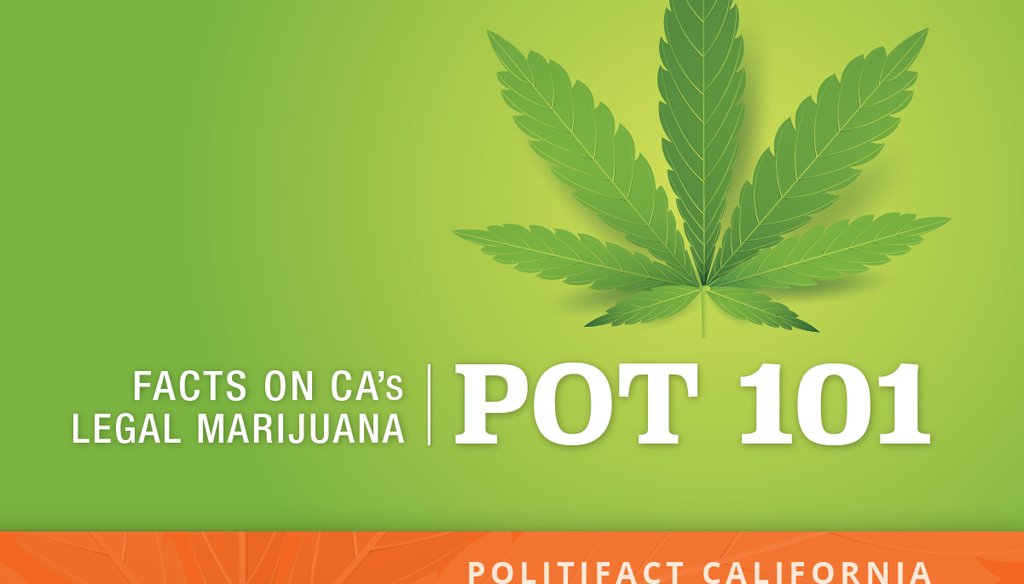Stand up for the facts!
Our only agenda is to publish the truth so you can be an informed participant in democracy.
We need your help.
I would like to contribute

California's recreational pot law doesn't offer the complete freedom to buy, smoke or transport weed anywhere you please.
Recreational marijuana sales became legal in California on Jan. 1, 2018, marking a major milestone for the state’s cannabis industry and its many customers.
Proposition 64, the voter-approved law that governs recreational pot in the Golden State, however, doesn’t offer the complete freedom to buy, grow and smoke marijuana just anywhere you please.
In reality, the rules are fairly strict. And they are consequential for employers and employees and anyone who wants to sell, purchase, consume or transport cannabis in the state.
There’s also the complication that marijuana remains illegal federally.
That point was made clear this week when U.S. Attorney General Jeff Sessions rescinded an Obama administration memo that recommended a hands-off approach to marijuana prosecution in states that have legalized pot. The move was seen as possibly paving the way for a federal crackdown on marijuana, though it’s uncertain whether that will happen.
President Trump, during his campaign for the White House, pledged to leave legalization up to the states, a topic we previously examined.
Below are some of the other key facts about what’s legal and what’s not -- at least under state law -- in California’s new cannabis landscape. It’s not a complete guide but we plan to update it as more questions arise.
.jpg)
A customer purchases marijuana at Harborside marijuana dispensary, Monday, Jan. 1, 2018, in Oakland, Calif. Starting New Year's Day, recreational marijuana can be sold legally in California. (AP Photo/Mathew Sumner)
The law permits adults 21 and up to buy 1 ounce of cannabis per day, which is enough material to fill a few dozen joints. You can alternately purchase up to 8 grams of cannabis concentrates found in marijuana edibles such as candies, brownies and breakfast bars.
The number of edibles you can legally possess depends on the product itself. A can of cannabis butter, for example, contains a larger amount of concentrates than a single edible, so concentrate-heavy products could put the carrier over the legal limit.
No matter the kind of cannabis you want, you’ll need to visit a state-licensed recreational dispensary. The agency that regulates marijuana, the California Bureau of Cannabis Control, has a complete and updated list of licensed dispensaries on its website.
You’ll need a valid ID or driver’s license. And you’ll also likely need cash as most dispensaries don’t accept checks or credit cards.
Finally, don’t expect to see any 24-hour pot shops: The law makes it illegal to sell between 10 p.m. and 6 a.m.
.jpg)
Different types of marijuana sit on display at Harborside marijuana dispensary, Monday, Jan. 1, 2018, in Oakland, Calif. Starting New Year's Day, recreational marijuana can be sold legally in California. (AP Photo/Mathew Sumner)
Buying legal recreational pot won’t be cheap, at least not initially.
The cannabis culture website greenstate.com estimated legal marijuana buyers in California "will pay about eight dollars more" for their usual $50 eighth of an ounce of "top-shelf flowers," under the new law. That cost is far more than on the black market, causing some marijuana advocates to worry customers will turn to underground sales.
Licensed dispensary costs include a new statewide 15 percent tax on all recreational and medical cannabis products plus additional local taxes and fees. In Oakland, for example, the added local tax is 10 percent for recreational pot and 5 percent for medical cannabis.
California consumers, however, could see prices reduced by as much as half over the next year if market patterns follow those in Washington state and Colorado, both of which earlier legalized recreational pot. That analysis came from cannabis analytics firm Headset and was reported on by MarketWatch.com early this year.
To stay within the law, you’ll need to consume cannabis on private property. "You cannot consume, smoke, eat, or vape cannabis in public places," according to the state Department of Public Health’s website.
Smoking marijuana where tobacco is prohibited is also illegal, unless there is a local ordinance expressly allowing its usage. This includes school campuses, restaurants, bars, public parks and hospitals -- essentially any public building.
Don’t expect to legally light up on campus: The University of California and California State University systems say they don’t plan to change their policies barring marijuana, according to a recent Sacramento Bee article.
UPDATE: In July 2018, a reader asked whether there’s any "anywhere where you can legally consume" marijuana, "besides in your own home, or maybe another private residence?"
As we reported in January, Californians are very limited in where they can legally consume pot. Private residences are still the safest bet. But that could soon change.
Cities across the state, from West Hollywood to Palm Springs to Sacramento, are considering permits for lounges and cafes, where smoking marijuana would be legal.
Prop. 64 allows local governments to permit cannabis consumption at public locations.
San Francisco and Oakland have already opened cannabis lounges, where people can legally smoke, vape and eat marijuana products. The lounges, however, are prohibited from allowing people to consume alcohol or tobacco in the same venue.
Another California law that went into effect Jan. 1 bans lighting up or snacking on any marijuana products while driving or riding as a passenger in a car. That includes cannabis edibles.
The new law also regulates how and where consumers can store marijuana while in a car, similar to the state's open alcohol container rules.
"It has to be sealed in a container. The seal cannot be broken. And if it is in an open container, it would have to be locked away in a place like the trunk," California Highway Patrol Sgt. Oscar Chavez told Capital Public Radio in December 2017.
Violations of that new law are considered infractions and punishable by a $70 fine.
Chavez said officers are trained to detect impaired drivers, whether the impairment is due to alcohol or marijuana. He said the same guidance applies to all drivers — if it’s not safe to drive, don’t get behind the wheel. The same DUI penalties also apply to both sets of drivers.
Property owners and landlords may ban the use and possession of cannabis on their properties, according to the state Department of Health.
The state agency outlined two other restrictions:
-
You cannot consume or possess cannabis on federal lands such as national parks, even if the park is in California.
-
It is illegal to take cannabis across state lines, even if you are traveling to another state where cannabis is legal.
It depends on your employer. There is no state law that protects employees from termination for using marijuana. A 2008 Supreme Court decision ruled that employers are entitled to fire employees who fail a drug screening for marijuana, regardless of state law.
It’s up to individual employers to continue to test for marijuana or decide to remove it from the common 5-drug panel that also tests for cocaine, PCP, opiates and amphetamines.
Prop 64 has specific language empowering employers to tailor their drug policy according to their wishes.
Employers that contract with the federal government may see a prohibition of use as well, since those employers will defer to federal law that still classifies marijuana as an illegal drug.
UPDATE: Since publication, we've added responses to several reader-generated questions below:
It is not legal to transport marijuana of any amount by plane, even if it’s medicinal. That includes trips within state borders and to other states that have legalized marijuana. The Transportation Security Administration, or TSA, defers to federal law, which still classifies marijuana as a Schedule I illegal drug.
Although possession while attempting to travel by plane is strictly illegal, the TSA website says that "security officers do not search for marijuana or other drugs." A TSA spokesman told the New York Times in April 2017 that screeners look for things that can take down an airplane, not marijuana. But that is not an assurance by any means. While the TSA dogs may be sniffing around your luggage for explosives, the Customs and Border Protection dogs are searching for illegal substances, marijuana included. This one is pretty cut and dry - if you attempt to fly with marijuana, you are breaking the law.
You are free to hit the road once you are no longer impaired. It is illegal to drive under the influence of any substance, marijuana included. There is not yet a standard way of measuring marijuana impairment, although researchers are racing to develop technology that can measure the drug’s levels, much like a breathalyzer test authorities use for alcohol. Unlike the .08 blood alcohol content measurement, there is no established threshold for THC levels in California that would automatically result in a DUI.
THC, or tetrahydrocannabinol, is the chemical compound in cannabis responsible for a euphoric high.
The California Office of Traffic Safety, or OTS, warns that even small doses of THC can slow a driver’s reaction time and the ability to make decisions. According to OTS, marijuana effects are strongest within the first hour of consumption and those who drive within that time period may double their risk of collision. OTS says impairment may take over four hours to subside - but that is just an estimate and should not be used as a blanket rule.
You’ll need a valid government-issued ID, but it can be from any state, according to a spokesman for the California Bureau of Cannabis Control. Options include a driver’s license; a military ID with a person’s picture and date of birth; or a passport issued either by the U.S. or by other countries.
We researched this reader-inspired question and answered it with a separate in-depth PolitiFact California article. The short answer is: Yes. Marijuana remains illegal under federal law. The Trump administration has taken a more agressive stance on enforcement. And pot dispensaries do collect customer information that could potentially be seized by federal agents and prosecutors. The likelihood of that happening, however, is very, very small, according to the marijuana policy experts we spoke with. The assumption is federal authorities would focus on large suppliers, not individual consumers who make small purchases. In the article, we also outlined an added legal protection for medical marijuana customers and legislative efforts to strengthen protections for recreational pot buyers.
A mother-of-three asked in June 2018 whether there are any rules on smoking marijuana at home around kids.
We wrote a full article on this here, and a summary below:
The answer depends on whether you rent or own your home. For renters, landlords can restrict the use of cannabis or even ban it completely. On the other hand, home owners can legally smoke at their property.
We couldn’t find any limits on smoking marijuana around kids at your home, unless it’s being used as a daycare or as transitional housing, according to a state Department of Public Health online brochure.
Experts on marijuana policies told us they did not know of any restrictions on smoking pot at home around children.
More to come
There’s still a lot to learn about California’s legal pot. We’ve just scraped the surface. We want to know your questions about what’s allowed and what’s not under the law.
We've added answers to some reader questions above and we'll research additional ones in the future.
Email us at [email protected], or contact us on Twitter or Facebook.
We’ll consider your question and we’ll add more to our article in future weeks and months. Also, if you hear a misleading claim about California’s legal cannabis, let us know. We’ll consider a formal fact-check on those in 2018 and beyond.
PolitiFact California interns Kathryn Palmer and Sami Soto contributed research and writing for this article.
Our Sources
PolitiFact California, Pot 101 update: Are there limits on smoking pot at home near kids? Where else is it legal to smoke?, July 17, 2018
PolitiFact California, How much privacy do you have when you buy marijuana in California?, Feb. 13, 2018
Desertsun.com, Marijuana goes legal in California on Jan. 1 -- what you need to know, Nov. 30, 2017
Capital Public Radio, New California Law Bans Smoking, Ingesting Marijuana While Driving Or Riding In Car, Dec. 18, 2017
Los Angeles Times, video, What you should know about California's marijuana regulations, Dec. 28, 2017
Sacramento Bee, Can I get fired for using legal recreational marijuana? An FAQ for California workers, May 27, 2017
Los Angeles Times, Marijuana is now legal in California, but it can still keep you from getting a job, Dec. 9, 2016
Los Angeles Times, 10 things you need to know about legalized pot in California, Nov. 7, 2016
Sacramento Bee, Legal pot starts Jan. 1 in California. But can you take it to class?, Dec. 29, 2017
Sacramento Bee, Here’s the lowdown on recreational marijuana starting New Year’s Day in Sacramento, Dec. 31, 2017
Los Angeles Times, Tips for buying marijuana in California: Bring cash, be careful, be patient, do your homework, Dec. 31, 2017
Proposition 64, text, accessed January 2018
Marketwatch.com, The price of weed in California could be cut in half by legalization, Jan. 5, 2018
Washington Post, Use of legalized marijuana threatened as Sessions rescinds Obama-era directive that eased federal enforcement, Jan. 4, 2018
Greenstate.com, How much will cannabis cost under California’s legal marijuana taxes?, Dec. 28, 2017
New York Times, California Today: What if Legal Pot Costs More Than Black-Market Pot?, Sept. 19, 2018
Associated Press, California slapping high taxes on marijuana, causing sticker shock for some, Nov. 5, 2017
Inverse.com, The Cost of Weed in California Still Depends on Who You're Buying It From, Jan. 3, 2018
















































